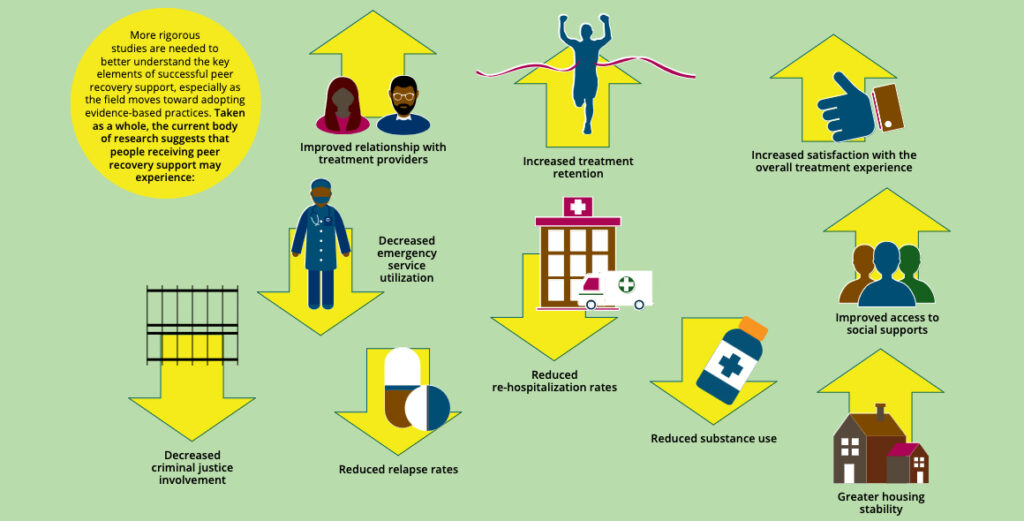What are peer recovery support services?
Peer recovery support services (1) delivered by peer recovery coaches, are one form of peer support. They involve the process of giving and receiving non-clinical assistance to support long-term recovery from substance use disorders. A peer recovery coach brings the lived experience of recovery, combined with training and supervision, to assist others in initiating and maintaining recovery, helping to enhance the quality of personal and family life in long-term recovery (White, 2009). Peer recovery support services can support or be an alternative to clinical treatment for substance use disorders. Peer-based recovery supports are part of an emerging transformation of systems and services addressing substance use disorders. They are essential ingredients in developing a recovery- oriented system in which clinical treatment plays an important, but singular, role. Acute care substance use treatment without other recovery supports has often not been sufficient in helping individuals to maintain long-term recovery. Substance use disorders are currently understood to be chronic conditions that require long-term management, like diabetes. Peer-based recovery support provides a range of person-centered and strength-based supports for long-term recovery management. These supports help people in recovery build recovery capital—the internal and external resources necessary to begin and maintain recovery (Best & Laudet, 2010; Cloud & Granfield, 2008).
What do peer recovery coaches do?
Peer recovery coaches walk side by side with individuals seeking recovery from substance use disorders. They help people to create their own recovery plans, and develop their own recovery pathways.
Recovery coaches provide many different types of support, including:
- emotional (empathy and concern)
- informational (connections to information and referrals to community resources that support health and wellness)
- instrumental (concrete supports such as housing or employment)
- affiliational support (connections to recovery community supports, activities, and events)
Recovery plans and other supports are customized, and build on each individual’s strengths, needs, and recovery goals.
Peer recovery support focuses on long-term recovery and is rooted in a culture of hope, health, and wellness. The focus of long-term peer recovery support goes beyond the reduction or elimination of symptoms to encompass self-actualization, community and civic engagement, and overall wellness.
The unique relationship between the peer recovery coach and the individual in or seeking recovery is grounded in trust, and focused on providing the
individual with tools, resources, and support to achieve long-term recovery.
Peer recovery coaches work in a range of settings, including recovery community centers, recovery residences, drug courts and other criminal justice settings, hospital emergency departments, child welfare agencies, homeless shelters, and behavioral health and primary care settings. In addition to providing the range of support encompassed in the peer recovery coach role, they take an active role in outreach and engagement within these settings.
1. Peer recovery support services, peer-delivered recovery support, and peer-based recovery support are used interchangeably.
Is Peer Recovery Coaching Effective?
People who have worked with peer recovery coaches provide strong testimonies of the positive impacts of peer recovery support on their own recovery journeys. The research supports these experiences. While the body of research is still growing, there is mounting evidence that people receiving peer recovery coaching show reductions in substance use, improvements on a range or recovery outcomes, or both. Two rigorous systematic reviews examined the body of published research on the effectiveness of peer- delivered recovery supports published between 1995 and 2014. Both concluded that there is a positive impact on participants (Bassuk, Hanson, Greene, Richard, & Laudet, 2016; Reif et al., 2014).

PEER Support Resources:
https://flagleroars.org/
https://www.peersupportfl.org/
https://onevoiceforvolusia.org/
https://volusiarecoveryalliance.org/
Originally published by SAMHSA: Bringing Recovery Reports to Scale (Get Original Here)
REFERENCES
Bassuk, E. L., Hanson, J., Greene, R. N., Richard, M., & Laudet, A. (2016). Peer-delivered
recovery support services for addictions in the United States: A systematic review.
Journal of Substance Abuse Treatment, 63, 1–9. doi: 10.1016/j.jsat.2016.01.003
Best, D., & Laudet, A. (2010). The potential of recovery capital. London: RSA Projects.
Retrieved from https://www.thersa.org/discover/publications-and-articles/reports/
the-potential-of-recovery-capital
Center for Substance Abuse Treatment. (2009). What are peer recovery support services?
HHS Publication No. (SMA) 09-4454. Rockville, MD: Substance Abuse and Mental
Health Services Administration, U.S. Department of Health and Human Services.
Cloud, W., & Granfield, R. (2008). Conceptualizing recovery capital: Expansion of
a theoretical construct. Substance Use & Misuse, 43(12–13), 1971–1986. doi:
10.1080/10826080802289762
Reif, S., Braude, L., Lyman, D. R., Dougherty, R. H., Daniels, A. S., Ghose, S. S., … Del-
phin-Rittmon, M. E. (2014). Peer recovery support for individuals with substance use
disorders: Assessing the evidence. Psychiatric Services, 65(7), 853–861. doi: 10.1176/
appi.ps.201400047
White, W. (2009). Peer-based addiction recovery support: History, theory, practice, and sci-
entific evaluation. Chicago, IL: Great Lakes Addiction Technology Transfer Center and
Philadelphia Department of Behavioral Health and Mental Retardation Services.